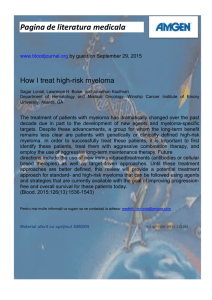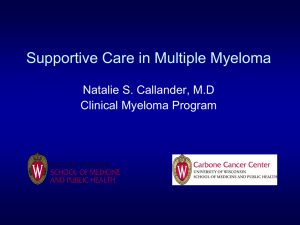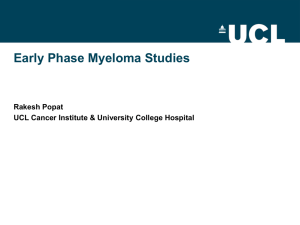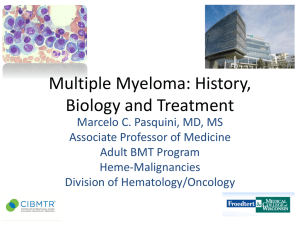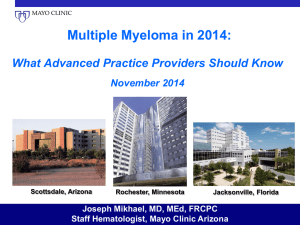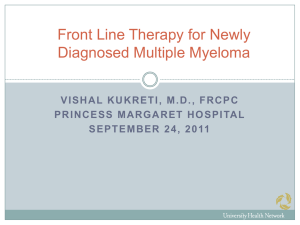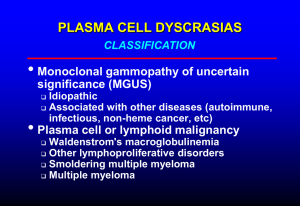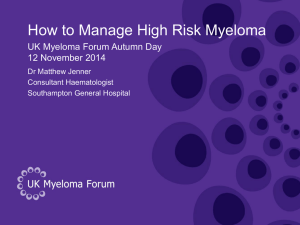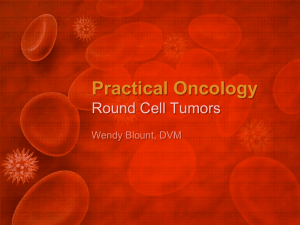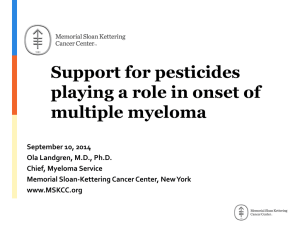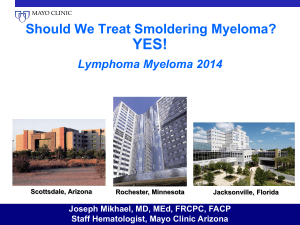Clinical Trials - Myeloma Canada
advertisement
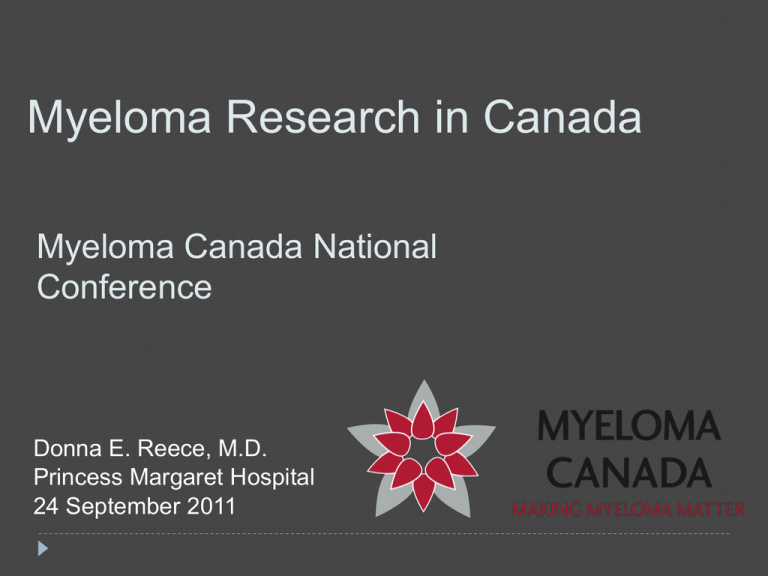
Myeloma Research in Canada Myeloma Canada National Conference Donna E. Reece, M.D. Princess Margaret Hospital 24 September 2011 Myeloma Research Clinical Trials Phase 1 Phase II Phase III Laboratory Studies Translational research Different drugs and combinations Different points in disease course (new diagnosis, early relapse, advanced relapse) Phases of Clinical Trials In-vitro and In-vivo studies Phase I: Safety and dosing Phase II: How well does it work? Phase III: How well does it work compared to previous treatments? Phase IV: Post marketing surveillance Phases of Clinical Trials Phase I Usually a relatively small, “dose escalation” study to determine the maximum tolerated dose (“MTD”) Can provide clues as to the anti-tumor effect of the drug Phase II The MTD is evaluated in a specific disease for Response rate Time to progression (TTP) Progression free survival (PFS) Overall survival Toxicity Phases of Clinical Trials (cont) Phase III Phase IV Randomized trial to establish a new drug is equivalent to or better than the previous standard therapy Often needed for regulatory approval (“Registration trial”) Usually large study Important endpoints are PFS and overall survival Post marketing surveillance Expanded access programs—very important in Canada until drug is approved by Health Canada! Who sponsors a clinical trial? National Cancer Institute of Canada (NCIC) Industry (pharmaceutical companies) Investigator-initiated trial Requires funding source, such as industry Trials may be single or multi-institutional Trials are EXPENSIVE! Comptetitive research grants do not cover clinical trials Steps in Starting a Clinical Trial Appropriate design Health Canada approval Local Research Ethics Board (REB, IRB) review and approval of trial and consent form Once started: Feasibility Statistical considerations Establish funding Continuous monitoring of side-effects and periodic review of results Monitoring visits by sponsor Audits by Health Canada, FDA, NCIC Need to keep track of the data Where we were 5-10 years ago…. NCIC trial MY-10 Phase III trial of maintenance after ASCT with thalidomide + prednisone vs observation A few industry sponsored trials Pamidronate and zolendronic acid trials Canadian centers active in phase III trials for the new myeloma drugs bortezomib (Velcade) and lenalidomide (Revlimid) for relapsed/refractory myeloma Progress in Myeloma Research Myeloma Cells Microenvironment Progress in Myeloma Research Identification of key signalling pathways in cancer cells Importance of microenvironment Myeloma subtypes Based on: Cytogenetics Molecular studies 17p del (loss of p53) t(4;14) Laboratory Research: From Bench to Bedside Identify target Validate target Develop/ identify drug against target Clinical Trial Step 1-Identify the Target and Patients other 46 mo 18 mo t(4;14) Detection of t(4;14) FGFR3 on Surface of Myeloma Tumor Cells t(4;14) other Step 2-Validate the Target Trudel S et. al, Blood, 2004 Step 3: Develop drugs against the target FGFR3 F N N N N N N O TKI-258 TKI-258 Tumor Regression Placebo TKI-258 or Placebo TKI-258 Increased Survival More step 3: R3Mab Antibody against FGFR3 Qing J, el al. J Clin Invest 2009; 119: 1216-1229 Unique anti-FGFR3 monoclonal antibody (Genentech) Advantage of selectivity Anti-tumor activity mediated in part via ADCC PMH is lead site for phase I-II trial in t(4;14) myeloma Are there drugs already out there that we can use? Purchase libraries of FDA-approved drugs, natural compounds High throughput screening Results of HTS Screen 50,000 chemicals “hit” (decreased fluorescence or viability) No effect of compound Myeloma Research in Canada Good basic science already ongoing in Calgary Edmonton Montreal St John Toronto Winnipeg But, limited opportunities for investigators to interact and brainstorm Myeloma Canada sponsored first Scientific Roundtable in Canada in November 2010 Enhancing Myeloma Research in Canada Myeloma Canada Scientific Roundtable in Montreal, QC in November 2010 Representatives from Canadian centres presented their laboratory work in myeloma Summary We have talent! Tangible results Enhancing Myeloma Research in Canada Myeloma Canada Research Network (MCRN) Provides umbrella for Canadian consensus guidelines for myeloma management Provides framework for collaborative trials across Canada First study t(4;14) trial of bortezomib-based therapy in newly diagnosed patients without planned ASCT Upcoming study for transplant-eligible newly diagnosed patients MCRN 001 Schema for Trial in Newly Diagnosed Transplant-eligible Myeloma Patients Bortezomibbased induction therapy High- dose melphalan + busulfex + ASCT Measure MRD at day + 100 Lenalidomide maintenance MCRN 001 Trial: Laboratory Correlates FISH cytogenetics, free light chain included at baseline Use multiparameter flow cytometry to measure minimal residual disease (MRD), which is better than older ways to measure response After induction After BuMel + ASCT During maintenance Follow HeavyLite chain assay throughout therapy PMH Clinical Trials in Myeloma Goal is to have trials for different disease setting First line therapy Post-transplant therapy (i.e., maintenance) Relapsed myeloma So called “double refractory” myeloma Induction before ASCT Initial therapy for patients not eligible for ASCT Defined as progression after both bortezomib and lenalidomide Aim for a spectrum of phase I,II and III trials Seek to have investigator-initiated trials Laboratory component is a high priority Current/Future Myeloma Trials at PMH Newly diagnosed patients Eligible for ASCT Study candidate yes t(4;14) study Len + Dex (Renal validation study) no Len + Dex + MLN 9807 ASCT CyBorD Current/Future Myeloma Trials at PMH Newly diagnosed patients Not Eligible for ASCT Study candidate yes t(4;14) study Len + Dex + MLN 9807 no Len + Dex +/Elotuzomab VMP MPT Other Current/Future Myeloma Trials at PMH Relapsed/Refractory Disease After 1-3 prior regimens Relapsed/refractory Bortezomib + dex +/- panobinostat (histone deactylase inhibitor) Lenalidomide + dex +/- carfilzomib (proteasome inhibitor) Lenalidomide + dex + +/- elotuzomab (antibody against myeloma cells) NCIC 191—aurora kinase inhibitor Pomalidomide + dex vs dex alone (IMiD) Pomalidomide + dex AKT inhibitor + bortezomib AKT inhibitor Targeting t(4;14) TKI 253 (Novartis) Monoclonal antibody against FGFR3(Genentech) Myeloma Research in Canada Laboratory and transitional research is ongoing Myeloma Canada research grant offers opportunities for young investigators New research organization under Myeloma Canada umbrella: MCRN Second Myeloma Canada Scientific Roundtable in Montreal, QC in November 2011 WE CAN DO THIS TOGETHER TO WORK TOWARDS A CURE!
